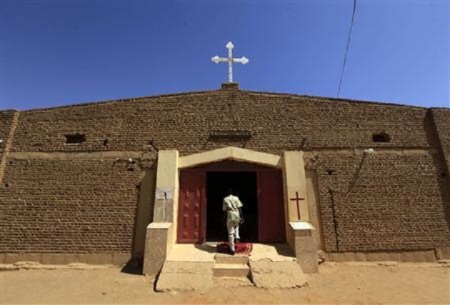Sudan abolishes death penalty for apostasy, reforms Islamist laws after 3 decades

The transitional government in Sudan passed a series of amendments that repeal the death sentence for apostasy, public flogging and female genital mutilation, giving Christians hope for the future following the toppling of the Islamist regime of President Omar al-Bashir last year.
Sudanese Minister of Justice Nasreldin Abdelbari confirmed Saturday the contents of the wide-reaching reform bill titled the Miscellaneous Amendments Act during a national television talk show.
The new amendments were initially approved in April but are just now going into effect, the BBC reports.
According to the independent Sudanese news outlet Dabanga, the amendments aim to align Sudan’s strict Islamic penal code with the 2019 Constitutional Declaration. The August 2019 document lays out how Sudan will be governed during the 39-month transitional period.
The declaration removes Islam as the primary source of law in Sudan, which has regularly been ranked as one of the worst countries in the world when it comes to Christian persecution, according to Open Doors USA’s annual World Watch List. The Bashir regime ruled for more than 30 years before its ousting in April 2019.
According to Abdelbari, the Ministry of Justice has abolished apostasy (when Muslims leave the faith) as a capital offense, saying that such a rule exposes people to danger. Before, anyone convicted of leaving the Islamic religion in Sudan could face the death penalty.
However, Dabanga reports that the law still criminalizes apostasy, but demands that prosecutors protect those who are accused.
The new amendments also direct police and immigration authorities to allow mothers to travel abroad with their children without the written permission of the father or a male family member.
Abdelbari confirmed that the legal changes will also allow non-Muslims to drink alcohol, a custom that was forbidden under the public order laws that barred several different behaviors. The new rule, however, still prohibits Muslims from consuming alcohol.
“We want to grant non-Muslims in Sudan their freedom and rights, as stipulated in the Constitutional Declaration,” Abdelbari was quoted as saying, adding that the new amendments don’t address the sale of alcohol or opening of bars.
“We leave these issues to discussions about Sudan’s future constitution,” Abdelbari added. “The fundamental amendments to the laws that we have adopted now, are linked to agreements made with the rebel movements during the peace talks in Juba. The old laws are a real challenge for the Sudanese. They should be broadly discussed in the future, by the people and by political parties.”
Abdelbari added that the Ministry of Justice “cannot go further” than it has and assured that the amendments are “related to the general policies of the government.”
“Drinking alcohol can be restricted again and the new amendment can be withdrawn later if that is what the Sudanese want,” he said.
Since Bashir’s ousting, Sudan’s transitional government has vowed to improve the country’s human rights and religious freedom conditions. Last year, Prime Minister Abdalla Hamdok met with members of the U.S. Commission on International Religious Freedom about its plans to improve situations for the country’s religious minorities.
In addition to the August Constitutional Declaration, the transitional government repealed a public order law last November. The public order law gave police officers the authority to arrested and punish people for violating religious moral teachings.
Under the Bashir government, Sudan had consistently been ranked as one of the top-10 worst countries in the world when it comes to Christian persecution, according to Open Doors USA’s World Watch List. Last December, the U.S. State Department moved Sudan off of its list of “countries of particular concern” for engaging in or tolerating egregious religious freedom violations.
Faith McDonnell, the director of religious liberty programs and the Church Alliance for a New Sudan at the Washington, D.C.-based Institute on Religion & Democracy, told The Christian Post on Tuesday that “it appears Sudan’s new transitional government is working to change things.”
“Very good news that Sudan has passed amendments repealing apostasy, public flogging, female genital mutilation, and taken some other steps towards religious freedom,” she said. “This is good news for Sudanese Christians, particularly for those in the center of the country.”
McDonnell warned, though, that Sudan “has a long way to go.”
“For Sudan to make real strides for freedom and improvement of human rights it needs to establish rule of law based in international norms of religious freedom and democracy — not Sharia — and to give equal status and rights to the marginalized people groups, [such as] the black African Sudanese, who comprise the majority of the country.”
McDonnell explained that indigenous people groups such as the Nuba, the Darfuri, the Beja and the Nubians “still face discrimination and persecution.”
“In the case of Darfur, they are still being harassed and even attacked by Islamist militias — the Janjaweed,” she stressed.
The issue of implementing Christianity as a school subject alongside Islam was not included in the list of amendments.
The Rev. Yahia Abdelrahim Nalu of the Sudan Presbyterian Evangelical Church said during an online conference last month that a large issue in Sudan is that many Christian and religious minority students are obligated to study Islam as a school subject, according to Morning Star News.
“Unfortunately, this is what is happening — most Christian students sit for Islamic religion for the sake of obtaining the certificate, but they end up victims of Islamization,” Nalu was quoted as saying.
Although official figures put the Christian population in Sudan around 3%, critics contend the actual Christian population of Sudan is much higher, according to Vatican News.
Follow Samuel Smith on Twitter: @IamSamSmith
or Facebook: SamuelSmithCP





















